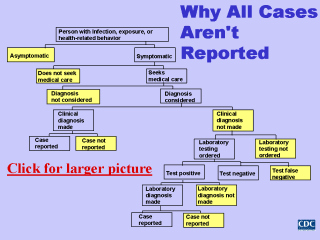 |
The final type of surveillance performance
indicator is focused on completeness of reporting. To help us appreciate why complete case
reporting is important, letís review some of the reasons why all cases of disease,
disability, or exposure that actually occur within a population or community are not
reported to our surveillance system.
First, the occurrence of some diseases,
health conditions, or exposures are rare, and thus, within a given year none may occur
within a community or population to report to a surveillance system. Even if the disease
or health condition does occur within some individuals, not all of them may have clinical
symptoms of disease, and thus may not seek medical attention. Among those patients who
have clinical symptoms, some may still not seek medical attention, and thus, not get
reported to the surveillance system. Of those who do seek medical care, their health care
providers may still not recognize their disease and thus, may not consider the diagnosis.
Even among cases that are clinically diagnosed, they may not be reported to the
surveillance system. Among cases in which a diagnosis is considered, in the end, health
care providers may still not decide upon the proper clinical diagnosis and thus, do not
order appropriate laboratory tests to rule in or out the disease diagnosis. Even if
laboratory tests are ordered, test results may be falsely negative, or if truly positive,
the laboratory diagnosis is not made. Finally, even if the proper laboratory diagnosis is
made, the case may still not be reported because the appropriate personnel are not aware
of the need and/or method for reporting the case to the local surveillance system. Itís
important to remember that reporting cases of disease to a surveillance system is not as
important to health care providers and laboratories as it is to us; they may not
appreciate the public health significance of diagnosing and reporting diseases and health
conditions to public health authorities in charge of surveillance systems. Thus, delays in
or failures to report cases of diseases to the surveillance system are not unexpected. |
